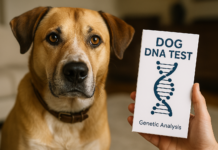Last Updated on April 13, 2023 by Dogs Vets
What Happens When a Dog Has Dementia?
Developing dementia in dogs, also known as Canine Cognitive Dysfunction Syndrome (CCDS), is a neurological condition that affects the cognitive abilities of our beloved pets.
This comprehensive guide will help you understand the symptoms, treatment options, and management strategies for dogs with dementia, and provide answers to some frequently asked questions about the condition.
1. Understanding Canine Cognitive Dysfunction Syndrome (CCDS)
Canine Cognitive Dysfunction Syndrome (CCDS) is a progressive, age-related decline in cognitive function, similar to Alzheimer’s disease in humans.
It occurs due to the degeneration of brain tissue and the accumulation of beta-amyloid plaques, which impair neural communication.
While the exact cause of CCDS is still unknown, factors such as genetics, inflammation, and oxidative stress are believed to contribute to the development of the condition.
2. Dementia in Dogs: Symptoms to Look For
CCDS presents a variety of symptoms that can impact a dog’s behavior, memory, and learning abilities. These dementia in dogs symptoms include:
- Disorientation: Dogs may become confused or lost in familiar surroundings.
- Changes in social interactions: They may become less interested in playing or interacting with family members and other pets.
- Sleep disturbances: Dogs may experience insomnia or sleep more during the day and less at night.
- House soiling: Dogs may forget their housetraining and begin to have accidents indoors.
- Increased anxiety: They may become more fearful or anxious, especially in new situations.
- Altered activity levels: Dogs may become lethargic or exhibit repetitive behaviors, such as pacing or circling.
- Memory loss: Dogs may forget familiar commands or previously learned behaviors.
- Changes in appetite: They may have difficulty eating or exhibit a decreased interest in food.
3. Dog Dementia: When to Put Down
Making the decision to euthanize a dog with dementia can be an incredibly difficult and emotional process. As a pet owner, it’s essential to consider the dog’s quality of life when making this decision.
The dog dementia when to put down decision should be based on factors such as the severity of the symptoms, the dog’s overall health, and the ability to manage the condition with appropriate care and medication.
Consult with your veterinarian to help determine the best course of action for your dog’s individual circumstances.
4. Dementia in Dogs: Treatment Options
Although there is no cure for dementia in dogs, several dementia in dogs treatment options can help manage symptoms and improve the quality of life for both the dog and its owner. These include:
- Medication: Drugs like selegiline and memantine can help improve cognitive function and reduce anxiety in dogs with dementia. Consult with your veterinarian to determine the most appropriate medication for your dog.
- Nutritional supplements: Antioxidants, omega-3 fatty acids, and other supplements can help support brain health and reduce inflammation.
- Diet: Feeding your dog a balanced, age-appropriate diet rich in antioxidants and essential nutrients can help support cognitive function.
- Mental stimulation: Engage your dog in interactive games and activities to keep their mind sharp and prevent boredom.
- Consistent routine: Maintaining a consistent daily routine can help reduce confusion and anxiety in dogs with dementia.
- Environmental modifications: Create a safe, comfortable living space for your dog by removing obstacles, providing non-slip flooring, and ensuring easy access to food, water, and resting areas.
5. Does My Dog Have Dementia? Diagnosis
If you suspect your dog may be exhibiting signs of dementia, it’s essential to consult with a veterinarian for a thorough examination and accurate diagnosis.
To determine does my dog have dementia, your veterinarian may perform the following:
- Physical examination: This helps rule out any underlying medical issues that could cause similar symptoms.
- Blood tests: These can help identify any underlying health problems or imbalances that may contribute to cognitive decline.
- Neurological examination: This can help assess your dog’s cognitive function and detect any potential neurological issues.
- Imaging: Brain imaging, such as an MRI or CT scan, can help identify any structural abnormalities in the brain.
6. Dog Dementia and Drinking Water: The Connection
Increased thirst and changes in water consumption can be a sign of many health conditions in dogs, including dementia.
Dog dementia drinking water habits may change due to confusion, forgetting where the water bowl is located, or experiencing difficulty drinking due to reduced motor function.
It’s essential to monitor your dog’s water intake and consult with your veterinarian if you notice any significant changes.
7. Dementia in Dogs at Night: Managing Sleep Disturbances
Sleep disturbances are a common symptom of dementia in dogs, often resulting in restlessness and increased activity during nighttime hours.
To help manage dementia in dogs at night, consider the following strategies:
- Maintain a consistent sleep schedule: Encourage your dog to sleep and wake at the same time each day to establish a routine.
- Create a comfortable sleep environment: Provide a quiet, dark, and comfortable sleeping area for your dog.
- Limit daytime napping: Encourage your dog to remain active during the day to help promote better sleep at night.
- Provide calming aids: Pheromone diffusers, calming supplements, or anxiety-reducing garments can help soothe your dog and promote relaxation.
- Consult with your veterinarian: If sleep disturbances persist, your veterinarian may recommend medication or other interventions to help manage nighttime restlessness.
8. Dog Dementia and Panting: What It Means
Dog dementia panting can be a sign of anxiety, stress, or discomfort in dogs with dementia. Panting may be the result of increased confusion or fear, as your dog struggles to understand their surroundings and experiences.
If your dog exhibits excessive panting, it’s essential to consult with your veterinarian to rule out any underlying medical conditions and determine the best course of action to manage your dog’s anxiety and stress.
9. Caring for a Dog with Dementia: Tips for Pet Owners
Caring for a dog with dementia can be challenging, but with patience, understanding, and a few helpful tips, you can help your pet maintain a good quality of life. Here are some tips for pet owners:
- Be patient: Understand that your dog’s behavior is a result of their condition, not a lack of obedience or training.
- Provide reassurance: Offer comfort and reassurance to your dog when they are confused or anxious.
- Maintain a consistent routine: A predictable daily schedule can help reduce confusion and anxiety in dogs with dementia.
- Offer mental stimulation: Interactive toys, puzzle feeders, and training exercises can help keep your dog’s mind engaged.
- Monitor changes in behavior: Keep track of any new or worsening symptoms and consult with your veterinarian as needed.
- Adapt your home environment: Make necessary modifications to your home to ensure your dog’s safety and comfort.
- Seek support: Connect with other pet owners who are caring for dogs with dementia for advice, encouragement, and understanding.
10. Conclusion
Dementia in dogs is a complex and challenging condition for both pets and their owners. By understanding the symptoms, seeking early diagnosis, and exploring available treatment options, you can help improve the quality of life for your furry companion.
Remember to maintain patience, provide support, and consult with your veterinarian to ensure the best possible care for your dog as they navigate this difficult journey.
Frequently Asked Questions
-
What is the life expectancy of a dog with dementia?
The life expectancy of a dog with dementia can vary greatly depending on factors such as the severity of symptoms, the dog’s overall health, and the effectiveness of treatment and management strategies. Some dogs may live for several years after diagnosis, while others may experience a more rapid decline in cognitive function.
-
Can dementia in dogs be reversed?
While there is no cure for dementia in dogs, some treatments and management strategies can help slow the progression of the disease and alleviate symptoms, improving the dog’s quality of life.
-
Do dogs with dementia recognize their owners?
As dementia progresses, a dog’s ability to recognize familiar people, including their owners, may decline. However, this varies from dog to dog, and some dogs may still maintain a strong bond with their owners despite cognitive decline.
-
Is dementia in dogs painful?
Dementia itself is not painful; however, dogs with dementia may experience confusion, anxiety, and stress, which can negatively impact their quality of life.
-
How can I help my dog with dementia at home?
Provide a consistent routine, mental stimulation, a comfortable living environment, and regular veterinary care to help manage your dog’s dementia symptoms. Be patient, understanding, and offer comfort and reassurance when needed.
-
What should I avoid doing with a dog with dementia?
Avoid exposing your dog to unfamiliar environments or situations that may increase their anxiety or confusion. Be mindful of changes in behavior and avoid pushing your dog to perform tasks that may be difficult for them due to cognitive decline.
-
Can younger dogs develop dementia?
Dementia in dogs is primarily associated with aging; however, some younger dogs may develop dementia due to genetic factors, injury, or illness. If you suspect your younger dog may be experiencing cognitive decline, consult with your veterinarian for a thorough examination and diagnosis.
Fact Check
We hope you enjoyed reading this article. What are your thoughts on the topic?
“At [Dogsvets.com], our goal is to bring you the most accurate and up-to-date information on all things pet-related.
If you have any additional insights or would like to advertise with us, don’t hesitate to get in touch.
If you notice any errors or discrepancies in our content, please let us know so we can correct them.
We welcome your feedback and encourage you to share this article with others.”























